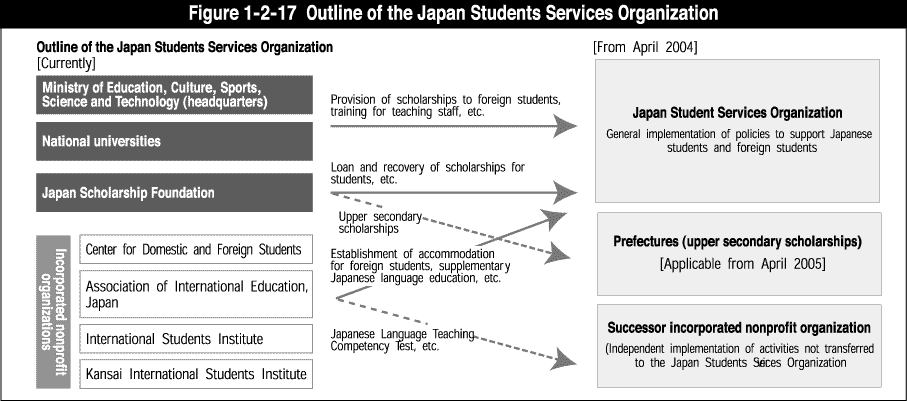| Home > Policy > White Paper, Notice, Announcement > White Paper > FY2003 White Paper on Education, Culture, Sports, Science and Technology >Part1 Chapter2 Section4.3 | ||
In response to the "Reorganization and Rationalization Plan for Special Public Institutions" decided by the Cabinet in December 2001, the Japan Student Services Organization Bill was passed in the 156th ordinary session of the Diet, and promulgated on 18 June 2003, and the Japan Student Services Organization (JASSO) is to be established in April 2004. The aims of JASSO are to implement comprehensively the various support measures for Japanese students and foreign students that were previously implemented by the national government, the Japan Scholarship Foundation, and incorporated nonprofit organizations related to foreign students, to cultivate creative and outstanding human resources with rich humanity able to support the next generation of society and to promote international mutual understanding ( Figure 1-2-17 ).

| 1) Scholarship loan programs |
JASSO is to continue implementation of the scholarship programs of the Japan Scholarship Foundation. The basic framework of the system, such as the types of scholarships for Japanese students, loan criteria and interest rate on the loans, will not change, but in order to improve further the scholarship program, from FY2004 the following systems are to be introduced.
Firstly, a new repayment exemption system for scholarships for graduate school students is to be introduced. In order to increase the desire of students to go on to graduate school and encourage them to study harder once there, the current repayment exemption system for students who have gotten education or research jobs is to be abolished, and a system to exempt graduate school students who achieved particularly outstanding grades in school from repayment at the time of graduation is to be established in its place.
Furthermore, improvements are planned to meet the demands of the age, such as increasing the size of scholarships to graduate law school students and providing scholarship loans to Japanese students studying overseas.
Secondly, the institutional guarantee system is to be introduced. This is a system allowing students receiving scholarship loans to receive the guarantee of a guarantee institution by paying a specified bond to the guarantee institution rather than by providing a joint surety or guarantor. Through this system, it becomes possible for even students who have difficulty obtaining a guarantee through joint surety and so on to receive scholarship loans by their own will and responsibility. Therefore, this system contributes to improving convenience for students and has value from the point of view of student independence. The system of joint surety and so on is to continue, and the student will be able to decide independently whether to select this system or the institutional guarantee system.
In addition, with a view to promoting decentralization, the upper secondary scholarship program previously implemented by the Japan Scholarship Foundation is to be transferred to prefectures beginning in FY2005, as it is for students entering upper secondary courses in upper secondary schools and special training colleges. In the process of this transfer, the Ministry of Education, Culture, Sports, Science and Technology will carry out the necessary support to enable prefectures to maintain the previous upper secondary scholarship loan criteria and implement the scholarship program smoothly.
| 2) Support programs for foreign students |
JASSO is to implement comprehensively the foreign student support activities previously implemented individually by the national government and related incorporated nonprofit organizations, and to carry out scrupulous and high quality support.
Specifically, JASSO is to provide scholarships to foreign students enrolled in universities in Japan and to Japanese students studying overseas. The plan is to improve support for Japanese students studying overseas in particular.
Furthermore, JASSO is to maintain foreign student accommodations in 10 prefectures throughout Japan (Hokkaido, Miyagi, Tokyo, Ishikawa, Kyoto, Osaka, Hyogo, Hiroshima, Fukuoka, Oita), utilize these accommodations as centers of international student exchange and implement a variety of exchange programs including exchange between foreign students and Japanese students, with the additional participation of local residents, elementary and lower secondary school students and others.
In addition, JASSO is to improve the information provision and consultation activities concerning studying in Japan and studying overseas, and to implement widely the Examination for Japanese University Admission for International Students (EJU) both inside and outside Japan so that students wishing to study in Japan can enter universities in Japan more smoothly. Also, it is to implement supplementary Japanese language education for Japanese government scholarship students and other foreign students.
Other activities include follow up programs (ex-post-facto support) for foreign students after they return to their own countries, and training for teaching staff in charge of foreign students at universities and other higher education institutions (refer to Part II, Chapter 10, Section 1).
| 3) Other student support programs |
JASSO, in addition to the above, is to gather, organize and then provide to universities and related institutions the various kinds of information about student consultations, job search guidance, internships and student exchange between universities and so on, useful for improving student support activities in universities and other higher education institutions. And it is to carry out consultations, advising and coordinating, and training programs for universities and other related institutions.
| Back To Top | MEXT HOME |